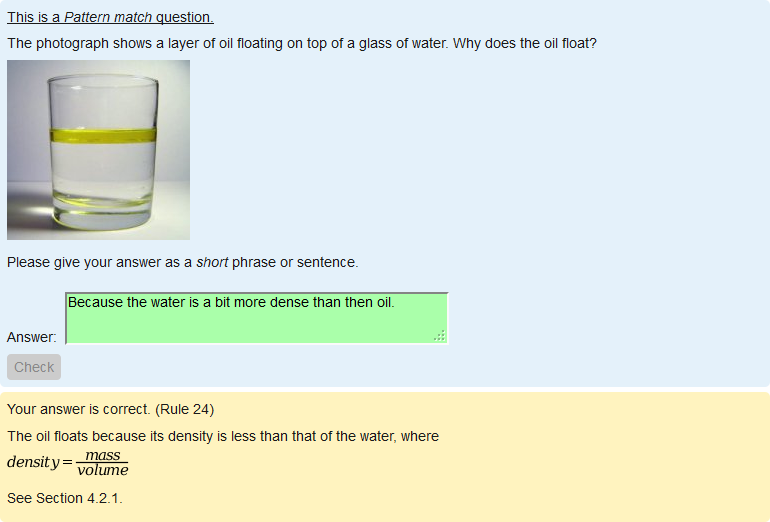Pattern-match question type: Difference between revisions
| Pattern-match question type | |
|---|---|
| Type | question type |
| Set | N/A |
| Downloads | https://moodle.org/plugins/qtype_pmatch |
| Issues | https://github.com/moodleou/moodle-qtype_pmatch |
| Discussion | https://moodle.org/mod/forum/view.php?id=737 |
| Maintainer(s) | Tim Hunt |
(Added note stating that the decimal separator needs to be a full stop.) |
(Added * Regular Expression Short-Answer question type additional plugin and * Preg question type additional plugin) |
||
| Line 24: | Line 24: | ||
* [http://moodle.org/plugins/browse.php?list=category&id=29 Other third-party question type plugins] | * [http://moodle.org/plugins/browse.php?list=category&id=29 Other third-party question type plugins] | ||
* [http://labspace.open.ac.uk/course/view.php?id=3484 eAssessment at the Open University with open source software] | * [http://labspace.open.ac.uk/course/view.php?id=3484 eAssessment at the Open University with open source software] | ||
* [[Preg question type]] additional plugin | |||
* [[Regular Expression Short-Answer question type]] additional plugin | |||
[[Category:Contributed code]] | [[Category:Contributed code]] | ||
Revision as of 16:08, 25 March 2018
- Managing questions
- Question behaviours
- Question types
- Calculated
- Simple Calculated
- Drag and drop into text
- Drag and drop markers
- Drag and drop onto image
- Calculated Multichoice
- Description
- Essay
- Matching
- Embedded Answers (Cloze)
- Multiple Choice
- Random Short Answer Matching
- Select missing words
- Short-Answer
- Numerical
- True/False
- Third-party question types
- Questions FAQ
Pattern-match questions allow the student to give an answer of up to about 20 words, which can then be automatically graded by matching the students response against a number of different patterns expressed in the PMatch syntax. The first matching pattern determines the score and the feedback.
This is a question type created and maintained by the Open University.
| Note: This question type assumes that the decimal separator is a full stop. It will not work if you try to use a a decimal comma. |
More documentation
More documentation is available in the Open University's reference manual. That includes a description of the pmatch syntax. There is another page that explains The OU PMatch algorithm, but that was written before development started, and may not be a 100% accurate description of what was finally implemented.
See also
- Other Moodle plugins from the Open University
- Other third-party question type plugins
- eAssessment at the Open University with open source software
- Preg question type additional plugin
- Regular Expression Short-Answer question type additional plugin
